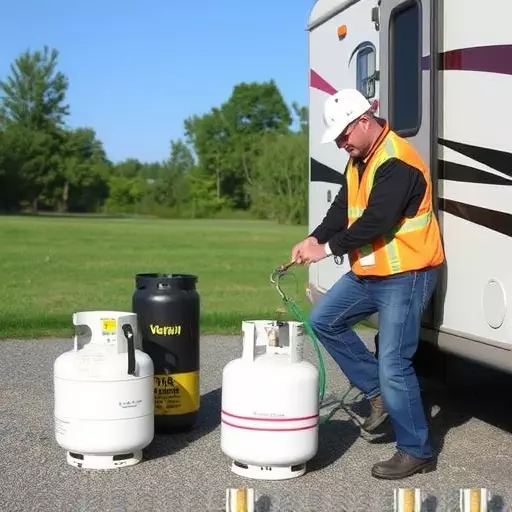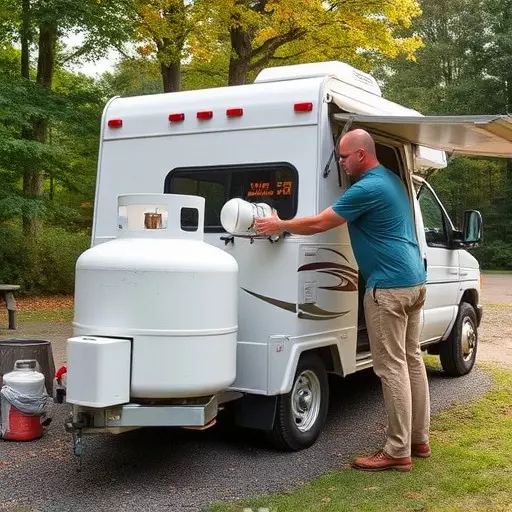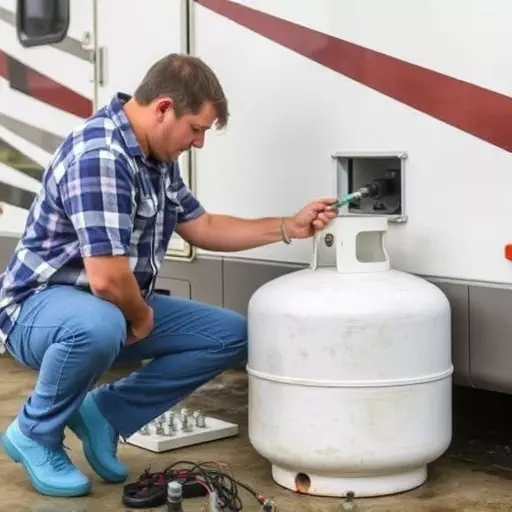Long RV trips demand meticulous attention to safe propane usage. Before leaving Camden, New Jersey, RV owners must inspect propane tanks, lines, and appliances for damage, corrosion, leaks, and proper ventilation. Following these propane safety guidelines minimizes risks, enhances peace of mind, and ensures efficient travel experiences. Regular tank level checks, secure connections, and well-maintained components are crucial.
Before embarking on long trips with your recreational vehicle (RV) in Camden, New Jersey, ensure a safe and smooth journey by thoroughly inspecting your propane system. This critical step, often overlooked, is key to preventing accidents and ensuring efficient propane usage in RVs.
From understanding basic components to following safety guidelines, this article equips you with the knowledge needed for a seamless inspection process, allowing you to maintain safe propane levels and enjoy your travels worry-free.
- Understanding Propane Systems in Recreational Vehicles
- Importance of Pre-Trip Propane Tank Inspection
- Key Components to Check During Inspection
- Safety Guidelines for Propane Usage in RVs
- Maintaining Safe Propane Levels for Long Trips
Understanding Propane Systems in Recreational Vehicles
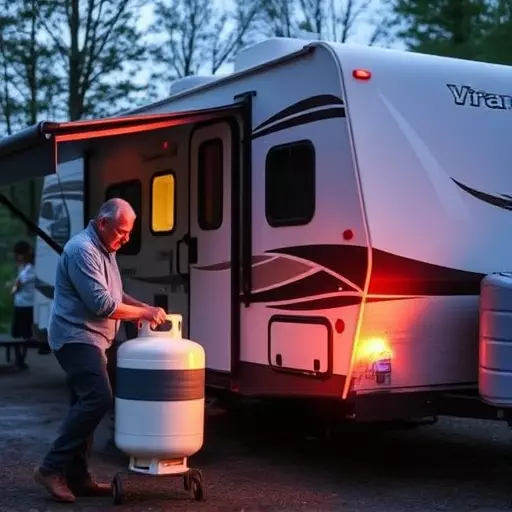
Propane systems in recreational vehicles (RVs) are integral to daily operations and safety, especially during extended trips. Understanding these systems is crucial for RV owners and drivers to ensure safe propane usage in Camden, New Jersey, and beyond. These systems typically include propane tanks, lines, and appliances designed to distribute heat and energy efficiently. Regularly inspecting these components before use is paramount to prevent accidents and malfunctions that could lead to hazardous situations.
Safe propane usage for recreational vehicles involves adhering to specific guidelines. Among them, inspecting propane tanks for signs of damage or corrosion is essential. Checking connections for leaks and ensuring proper ventilation are also critical steps. By following these propane safety guidelines for RVs, drivers can mitigate risks associated with using propane as a primary energy source during trips, enhancing overall peace of mind and travel experience.
Importance of Pre-Trip Propane Tank Inspection
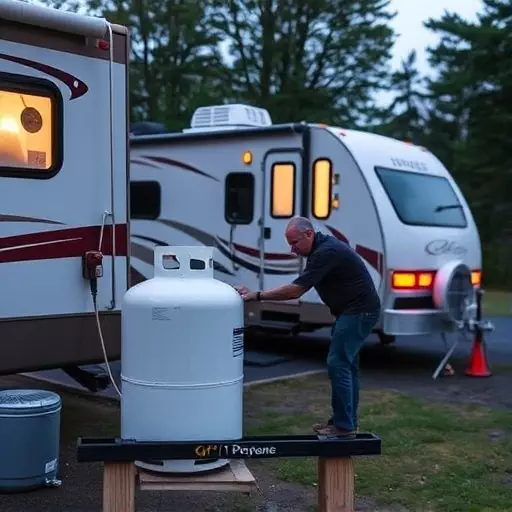
Before embarking on any long trip in your recreational vehicle (RV), ensuring safe propane usage is paramount. In Camden, New Jersey, and beyond, proper propane tank inspection is a fundamental aspect of RV maintenance, offering peace of mind for folks hitting the road. This pre-trip ritual involves a thorough examination of the propane system, with a focus on the tanks—a critical component given their role in providing heat, cooking facilities, and even water heating during journeys.
By inspecting propane tanks before use, RV owners can identify any potential issues or signs of damage. Leaks, corrosion, or unusual pressure readings could indicate problems that, if left unaddressed, could lead to hazardous situations. Following established propane safety guidelines for RVs is essential, as it ensures not only the integrity of your vehicle but also promotes responsible and secure camping experiences.
Key Components to Check During Inspection
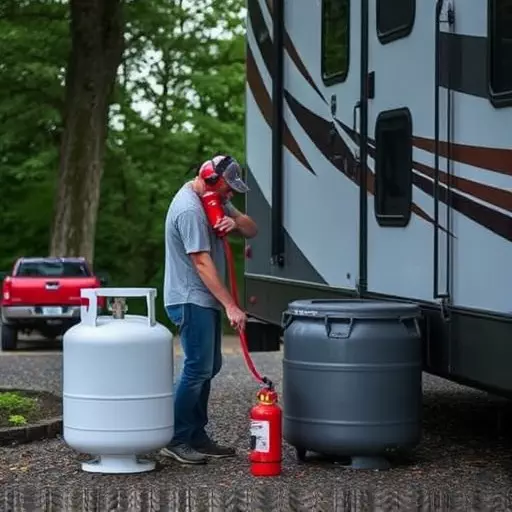
When preparing for a long trip in your recreational vehicle (RV) or camper, a thorough inspection of the propane system is non-negotiable. This process ensures safe propane usage and prevents potential hazards. Focus on these key components during your check:
1. Propane Tanks: Start by examining the condition of your propane tanks. Look for any signs of corrosion, cracks, or leaks. Ensure they are properly secured and in good working order, as damaged tanks can lead to dangerous situations. Check the pressure gauge to confirm the tank’s pressure level is within the recommended range.
2. Lines and Connections: Inspect all propane lines and connections for any damage or wear. Look for loose fittings, which could result in leaks or fires. Verify that all valves open and close smoothly, and replace any worn-out o-rings or gaskets to maintain efficient and safe gas flow.
Safety Guidelines for Propane Usage in RVs

Before embarking on a long trip in your recreational vehicle (RV), proper inspection and adherence to safety guidelines for propane usage are paramount. In Camden, New Jersey, or any location, ensuring the integrity of your propane system is crucial. Begin by visually inspecting the propane tanks for any signs of damage, corrosion, or leaks. Check connections and lines for wear and tight seals, as even a tiny crack can lead to dangerous gas accumulation.
Follow recommended maintenance practices, such as regularly checking pressure levels and ensuring proper ventilation during use. Never operate appliances without adequate airflow, as it can cause buildup of flammable gases. Store propane tanks securely, away from heat sources or open flames, and ensure they are properly labeled and maintained according to the manufacturer’s guidelines. These measures contribute to safe propane usage for recreational vehicles, minimizing risks associated with potential leaks or malfunctions during your journey.
Maintaining Safe Propane Levels for Long Trips

Maintaining Safe Propane Levels for Long Trips
Before embarking on a long trip in your recreational vehicle (RV) or camper, it’s crucial to inspect your propane system thoroughly. This process, often overlooked, is a critical step in ensuring safe propane usage for recreational vehicles in Camden, New Jersey, and beyond. Start by checking the propane tank levels; ensure they are at least halfway full to avoid mid-journey shortages, which can be hazardous in remote areas.
Inspecting propane tanks before use is a set of safety guidelines for RV owners. This includes verifying that all connections are secure and free from leaks, as well as examining the condition of the propane lines and regulators. Regular maintenance not only enhances safety but also helps prevent costly repairs during your trip. Remember, proper propane management is key to a stress-free and enjoyable journey.
